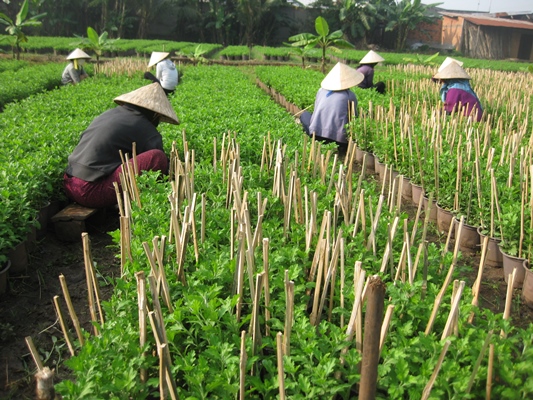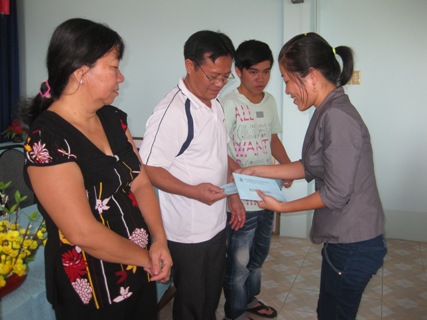Since the law on gender equality took
effect on July 1, 2007, the implementation of gender equality affairs has been
paid more attention to. The district’s People’s Committee has promptly issued
plans to implement the national strategies and programs on gender equality in
the period of 2011-2015 and in the period of 2016-2020. Also, the district’s
Women’s Union has given the district’s People’s Committee advice on how to
direct the district’s committees, sectors, unions and people to implement gender
equality strictly and effectively to create favorable conditions for both men
and women to promote their ownership and equality in all areas of socio-economic
and family life, and make an important contribution to successfully implementing
the district’s political tasks. The implementation of gender equality has
initially gained encouraging results, and gender equality has gradually seen new
development steps.

Women help each other to do business
Since the law on gender equality took and was
executed under the guidance of the higher-level Women’s Union and concerned
committees and sectors, the district’s Women’s Union has developed and issued
Plan no. 13/KH-PN dated June 30, 2008 on how to disseminate legal education to
women to guide communes’ Women’s Union to carry out and make plans to coordinate
with the district’s “For Women’s Progress” Committee, committees, sectors, and
unions to disseminate information to and help all Women’s Union officials and
membes and women to fully grasp information through the forms of round talks,
seminars, conferences, training classes, meeting activities, writing contests
to learn about the law on gender equality, which are organized by the district
and the province and timely supply materials for Women’s Union members and
women. Those efforts have contributed to raising the awareness of officials and
people of gender equality to gradually eliminate the idea of “Value men above
women” and implement gender equality between men and women in labor, production
and other social activities.
The law on gender equality law has been introduced
in various forms, from issuing documents to organizing propaganda and training
activities. The participants in training sessions on disseminating propaganda
and the law on gender equality are the officials and civil servants who take
charge of the tasks related to gender equality and for women’s progress at
district and communal levels, officials and members of levels of Women’s Union,
chiefs and deputy chiefs of hamlets, heads of sub-Women’s Union, and people.
In recent times, propaganda activities about the law
on gender equality have been disseminated to more than 40,000 arrivals of
participants. Disseminating policies and the law on gender equality has
contributed to raising the awareness and sense of responsibility of all levels
of authorities, sectors and classes of people in the community, families and all
the society of gender equality and for women’s progress. Since the state
management of gender equality affairs was transferred to the Division of Labor,
War Invalids and Social Affairs, the division has arranged 1 leader and 1
official to be in charge of gender equality affairs and for women’s progress. In
addition, the officials in charge of family and children affairs are assigned to
take care of gender equality affairs and for women’s progress. The official in
charge of gender equality affairs at district and communal levels get trained on
professional skills and training courses are held by the district’s Department
of Labor, War Invalids and Social Affairs.
The propaganda activities to raise the public
awareness of gender and gender equality have been paid attention to by district
and grassroots-level women’s unions, have been actively implemented and included
in propaganda contents in the past 10 years together with the following
contents: disseminating propaganda activities on studying and following Uncle
Ho’s moral example of gender equality; Directive no. 37-CT-TW of the 7th Party
Central Committee Secretariat on “The affairs of female officials in a new
situation”; the government’s Decree no.19-2003-ND/CP stipulating the
responsibilities of the state administrative agencies at all levels to ensure
that levels of Vietnam Women’s Unions are involved in the State management;
Resolution no. 11NQ/BCT on the affairs of women in the period of national
industrialization and modernization and the implementation of the sub-project 1
of “ Propaganda and education about the moral qualities of Vietnamese women in
the period of accelerating the national industrialization and modernization”.

Promoting female officials’ leadership role
From 2007 to 2017, every year Women’s Union
disseminated propaganda activities about gender equality, and the law on how to
prevent and control domestic violence to its officials, members, and women with
more than 18,000 participants; collaborated with committees, sectors, local
authorities, and Cam My district’s radio station to in holding regular
propaganda campaigns on gender equality and for women’s progress, especially the
dissemination of propaganda and education about gender and legal policies on
gender equality in various forms like disseminating propaganda information on
the radio stations of the district and communes; printing and giving away
leaflets; hanging propaganda banners on the occasion of the “action month” on
gender equality; disseminating propaganda information on propaganda vehicles in
far-flung remote and hard-to-access areas in communes. In addition, the
propaganda activities on gender equality law are integrated with the
get-togethers on the occasion of International Women’s Day – March 8, Vietnamese
Family Day - June 28, Vietnamese Women’s Day – October 20 and so on;
collaborating with the district’s radio station in disseminating regular
propaganda information on the contents related to the law on gender equality;
the government’s Decree no. 55/2009/ND-CP dated June 10, 2009; the provincial
Standing Party Committee’s Resolution no. 07-NQ/TU on the implementation of the
Politburo’s Resolution no. 11/NQ-TW on women’s affairs in the period of
accelerating the national industrialization and modernization; the targets in
the national strategy on gender equality in the district on the radio stations
at district to communal levels, which is broadcast every Monday and Wednesday.
In the past 10 years, 1,200 items and pieces of news; 295 articles; and 20
special themes with a total duration of more than 600 hours have been carried
out. In addition, 25 reports and 127 news pieces have been made and sent to Dong
Nai Radio and Television Station; 68 classes on domestic violence prevention,
gender equality law, legal education, and women’s moral education in the period
of industrialization and modernization; education about how to be good parents
for 5 million mothers and so on with 3,325 paricipants; collaboration with the
district’s Division of Culture and Information to hold a Family Culture and
Communication Day on the occasion of the National Action Month on Domestic
Violence Prevention and Control on the occasion of Vietnam Family Day (June 28,
2001 - June 28, 2016).
Forums and seminars on the occasion of the
Anniversary of the elimination of violence against women on November 25;
Vietnamese Family Day; International Women’s Day with propaganda topics like
communicative culture in family life, Vietnamese women’s ethical qualities of
Vietnamese women in the period of the national industrialization and
modernization, propaganda information on marriage and family law, the law on
prevention of domestic violence, the law on gender equality, human trafficking
prevention, and child labor prevention have been held, attracting nearly the
participation of 3,500 children and more than 2,500 adults.
On the occasion of the International Women’s Day –
March 8 and Vietnamese Women’s Day – October 20, a lot of activities like
get-togethers, cooking competitions, flower arrangements, “Nice men and lovely
ladies” contests, fashion shows, “Be more beautiful everyday” contests, fashion
shows, training sessions on communication skills and international
communication, and so on were held. In addition, special theme talks on women’s
role in the period of industrialization and modernization; propaganda activities
for women’s progress were disseminated to all the female officials and civil
servants that are working for the district’s agencies and units with the
participation of more than 3,000 arrivals of officials were integrated.
Also, 25,750 documents, magazines, and propaganda
leaflets on the law on gender equality; the law on prevention and control of
domestic violence, and child sexual abuse; and taking care of juvenile health
for the district’s officials and people were given away.
Duy Minh (Thanh Hai)